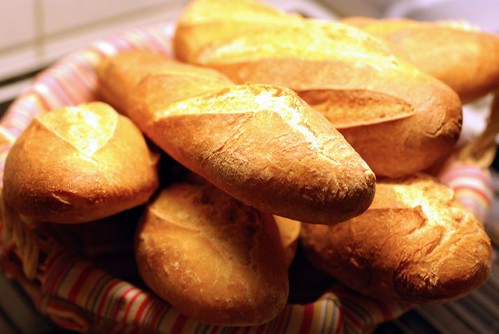The French have a amazing approach for working their dough, the one which makes a far excellent item, light with a great texture and a delightfully thin crisp crusting.

French Baking initially got my consideration when I was back in the British visiting my family and I figured out of this amazing technique of working dough from the famous French Baker, Richard Bertinet, coincidentally now living in my old home town of Bath, where he operates a baking school, we were almost neighbors! Richard is definitely one involving a few leaders of this "French Technique" of working dough in the English conversing world. When you are in the UK at any time I would urge you most highly to go check out a master at work and contact Richard Bertinet.
Within these recent years since capturing the bug, there's a few issues that I've discovered that if I'd if I'd recognized from the beginning could have saved significant amounts of the mistake from my trial and error! You probably have no need for any kind of professional devices, or capabilities that take years to master, only a couple of straightforward tricks and methods that can be simply discovered in just a few hours! And once you've discovered these tricks you'll see that anyone can produce French bread like a master baker in a normal domestic kitchen!
The 5 hot points for producing excellent french bread in your kitchen.
- Go French and Don't Look Back. And so what's so fantastic concerning this entire "French-Technique" hoo-hah? It is all regarding the technique of working (kneading) the dough allowing you for a much looser, (wetter) mixture, that results in a lighter, springier, more elastic and responsive dough. This dough increases wonderfully with no dependence on any improvers and generates a actually fantastic texture of crumb and a light crunchy crust, special of French bread. These results are quite unlike those produced by other kneading techniques where recipes naturally demand a greater flour content to prevent the dough from sticking to everything as it's being kneaded. Breads produced in this manner will predictably be heavier, have a denser texture and a thicker crust.
- Discover a Baking Training course. Being aware of what it takes to create top-quality bread is an experiential occurrence. There's no other method to learn bake bread than to roll up your sleeves and get your hands in the dough. Let's start with coming from all be ready to try and fail, and learn from your errors, that's the joy of understanding, the second thing is discover a baking course in your area where you can see for yourself just how to work dough and bake bread the traditional French way, get an understanding of all the techniques and a feel for how wet of sticky the dough should be Believe me it will be worth it.. An image explains to a thousand words but an exhibition tells a million.
- Have an Comprehension of Hydration. Almost everywhere in the world I bake I have to modify the recipe, it's learning the persistence that's the most critical situation. Recently I moved from inner Melbourne out to the forested hills 40 minutes out to the east, immediately I noticed that I needed to reduce the amount of water I was adding to my mix by over 15% to account for the higher humidity levels!!! Practice will give you the experience to get a feel of the "right" consistence, but again, a teacher will get you there much faster.
- Weigh ALL Your Ingredients. Especially weigh the water if you want to be able to repeat a result you must know exactly what went to produce that result, measuring by volume just isn't accurate enough.
- Take Notes. Always work to a recipe, but know that you will almost certainly need to make an adjustment. So make sure that you take notes of exactly what you've done, and then if you make an improvement you've got a new best recipe, and you know how to reproduce it. Knowing how to make adjustments is something that only experience will show you, but taking notes will speed this process along. If you don't take notes you're flying blind.
Would you like to fast track all that trial and error to get the experience you need to bake bread with confidence and producing better results than you can even imagine?
Related topics, you might interest





No comments:
Post a Comment